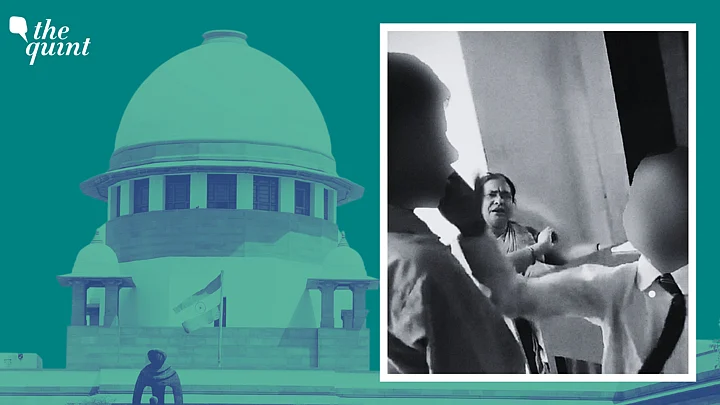Earlier this month, a teacher in Muzaffarnagar allegedly instructed the children in her class to hit their classmate. As the child (seven years old, as per media reports) suffered the assault, the teacher purportedly made offensive remarks about his religion.
The allegations, if true, should "shock the conscience of the State," Supreme Court's Justice Abhay S Oka noted on Monday, 25 September.
In its order, the Supreme Court said:
"There cannot be quality education if, in a school, a student is sought to be penalised only on the ground that he belongs to a particular community."
Further, the court sought the provision of better educational facilities for the child.
But while the Supreme Court's reaction in this matter is of tremendous consequence and value, can the buck truly stop with the teacher? Or even with the school?
In the 20th century, Rabindranath Tagore had written: "they (children) should not have mere schools for their lessons, but a world whose guiding spirit is personal love."
However...
...In a world afflicted by divisive forces, where communal banter fuels prime-time television news, calls for violence emanate from religious meet-ups, and politicians unabashedly indulge in hate speech, "personal love" may be hard to come by. Even for children.
A Washington-based group recently found that 255 hate speech gatherings (targeting Muslims) were documented in India in the first half of 2023 alone. Additionally, the report stated that over 70 percent of these incidents took place in states where elections were due soon.
Thus, the proliferation of hate may be very profitable electorally. But hate is uncontainable, and sometimes, it bares its fangs at little children.
Expressing alarm at the Muzaffarnagar incident, the apex court said that "there is a prima facie failure on the part of the State to comply with the mandatory obligations under the Right To Education (RTE) Act and the rules framed thereunder." It also noted that there is "a mandate that the local authority shall be responsible for ensuring that no child is subjected to caste, class, religious or gender abuse or discrimination in the school."
Hence, the Supreme Court asked the state government to appoint an IPS-level officer to take over the probe.
But this is not the first time that the apex court has come down heavily on the bazaars of hate and the state's seeming inability to check them.
What SC Has Said vs...
In 2018, the apex court had said: "It is requisite to state that our country must sustain, exalt and celebrate the feeling of solidarity and harmony so that the spirit of oneness is entrenched in the collective character. Sans such harmony and understanding, we may unwittingly pave the path of disaster."
In October 2022, the top court had noted that "the Constitution of India envisages Bharat as a secular nation," and asked the states of Delhi, Uttarakhand and Uttar Pradesh to take direct action against those making hate speech, without waiting for any complaint to be filed.
"They (the three states) shall ensure that as and when any (hate) speech or action takes place without any complaint being filed, suo motu action is taken in such cases in future without waiting for complaints."Supreme Court
Thus, it remains unclear how despite such clear directives by the apex court, such instances (as alleged in the Muzaffarnagar case) continue unabated. It also remains entirely obscure why the states appear to await the apex court's intervention before pulling up their socks.
On Monday, the apex court took note of the fact that even though the complaint in this case related to cognizable offences, only a non-cognizable report was filed initially. Even the FIR, the court observed, was registered "after a long delay."
It should also be noted that the FIR against the accused teacher has been filed under:
Section 75 of the Juvenile Justice (Care and Protection of Children) Act 2015: Punishment for cruelty to child
Section 323 IPC: Punishment for voluntarily causing hurt
Section 504 IPC: Intentional insult with intent to provoke breach of the peace
The petitioners have argued that, in addition to the above sections, the second proviso (which comes into play when the accused is a person employed by an organisation entrusted with the care of the child) to Section 75 of the JJ Act, as well as Section 153A IPC (promoting enmity between different groups on grounds of religion etc) should also apply.
What Happens Next...
The IPS-level officer will now be mandated, by the apex court, to find answers regarding the applicability of these suggested sections. Meanwhile, it also noted that "the learned ASG assures that the State does not want to protect anybody and will ensure that the law is implemented."
What happens next, tomorrow will tell. But in the words of Tagore:
"From the solemn gloom of the temple children run out to sit in the dust, God watches them play and forgets the priest."
(With inputs from LiveLaw, PTI, and The Hindu.)
(Mekhala Saran is studying Global Media and Digital Communications at SOAS, University of London. She was formerly The Quint's Principal Correspondent - Legal. Find her on X @mekhala_saran. This is an opinion piece and the views expressed are the author's own. The Quint neither endorses nor is responsible for them.)
(At The Quint, we question everything. Play an active role in shaping our journalism by becoming a member today.)
